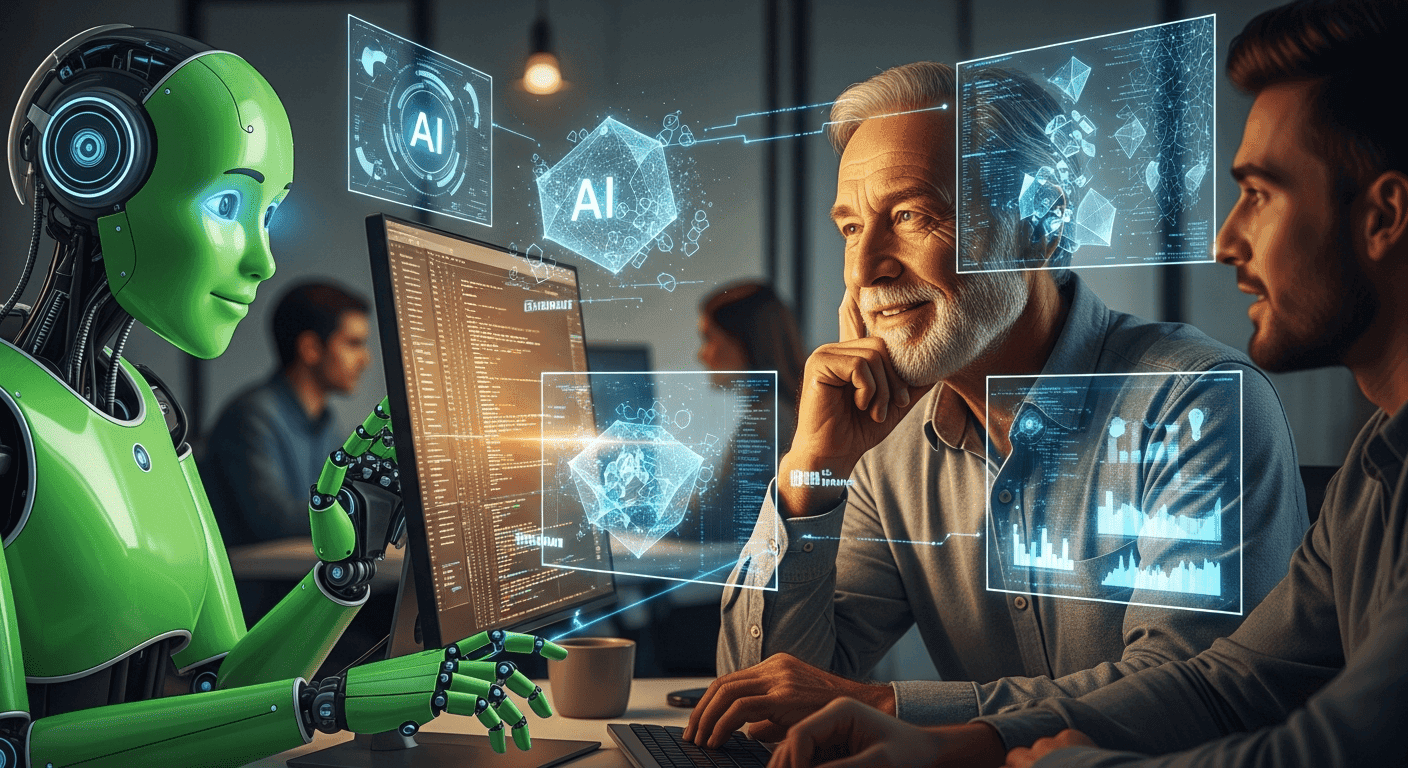The software industry is at a turning point as AI tools such as GitHub Copilot, ChatGPT, and Amazon CodeWhisperer become standard across engineering teams. Over the last year, hiring patterns at major tech companies and startups have begun shifting toward smaller, leaner teams supported by AI. The biggest question now is who benefits and who loses. Early indicators suggest junior developers may face an uphill climb—while experienced engineers gain strategic importance.
Background: How AI Became a Coding Force
AI-assisted coding moved from novelty to mainstream after 2022, when large language models matured enough to reliably generate functions, tests, refactoring suggestions, and documentation. Companies embraced these tools amid rising development costs and expectations for faster delivery pipelines.
Recent productivity studies from GitHub and McKinsey show developers completing tasks 20–55% faster using AI copilots. This acceleration is now influencing hiring decisions.
Key Developments: Industry Shifts and Early Data
Several major trends are shaping the current landscape:
1. Decline in Entry-Level Hiring
Recruiters report a dip in junior developer openings, especially in outsourced and support-heavy roles. Many tasks once assigned to new hires—bug fixes, documentation, boilerplate coding—are now handled efficiently by AI tools.
2. Rising Demand for Senior Engineers
Startups and enterprises are now prioritizing senior talent who can:
- Design scalable architectures
- Review AI-generated code for accuracy
- Make high-impact product and engineering decisions
- Manage complex integrations and security considerations
These responsibilities require judgment and experience—skills AI cannot replicate.
3. New Hybrid Roles Are Emerging
Companies are creating roles such as AI-Augmented Developer, Prompt Engineer, and AI Systems Reviewer, usually filled by mid- to senior-level engineers.
Expert Insights
Industry analysts argue that AI is not replacing developers outright but redistributing value.
- A senior engineer at Google recently noted: “AI can write code, but it can’t understand product context or consequences. That’s where senior engineering remains irreplaceable.”
- McKinsey researchers predict that AI will automate up to 30% of coding tasks by 2030, but complex system design will stay human-led.
Technical Explanation: Why AI Can’t Replace Experience
AI excels at pattern-matching, generating code, and optimizing repetitive tasks. But large-scale engineering requires skills AI doesn’t have, such as:
- Understanding trade-offs between performance, scalability, and cost
- Anticipating long-term architectural consequences
- Navigating ambiguous product requirements
- Ensuring security, compliance, and data governance
- Coordinating multi-team development pipelines
Think of AI as a powerful intern—fast, tireless, and helpful—but still needing supervision.
Implications: What This Means for Developers
For Juniors:
- The entry barrier is higher.
- Learning fundamentals, system design, DevOps basics, and debugging becomes more important.
- AI literacy becomes a must-have skill.
For Seniors:
- Their strategic value increases.
- They become responsible for guiding AI-assisted workflows.
- They play a bigger role in review, architecture, decision-making, and product alignment.
For Companies:
- Smaller teams can ship features faster.
- Hiring may lean toward fewer but more skilled engineers.
- AI-integrated workflows become a competitive advantage.
Challenges & Limitations
Despite its benefits, AI also brings risks:
- Over-reliance may erode fundamental coding skills in new developers.
- AI-generated code can introduce subtle bugs or security gaps.
- Ethical concerns around training data and intellectual property persist.
- Teams must maintain strong human oversight to avoid cascading failures.
Future Outlook
Over the next 3–5 years, AI will continue expanding its role in coding, documentation, and testing. Junior opportunities may shift toward more interdisciplinary roles—AI operations, automation engineering, and product-tech hybrids. Senior developers will increasingly act as architects and AI supervisors.
The industry’s north star is clear: human expertise enhanced—not replaced—by AI.
Conclusion
AI is changing the developer landscape, but not in a simple “replace humans” narrative. Instead, it amplifies the value of experience while automating routine work. The future belongs to developers—junior or senior—who embrace AI as a collaborator, not a competitor.
OUR TAKE
AI isn’t diminishing human creativity; it’s refocusing it. Senior engineers now stand at the helm of AI-accelerated teams, guiding systems that automate the mundane while unlocking higher-level innovation. The shift may challenge traditional career paths, but it also opens the door to a new era where craftsmanship, judgment, and strategic thinking matter more than ever.
